International, Interdisciplinary Symposium Point Sud
Accra, 12-16 December 2023
Conveners: Dr. Kwabena Opoku Agyemang, University of Ghana, Legon; Prof. Dr. Eva Ulrike Pirker, Vrije Universiteit Brussel; Prof. Dr. Stefanie Michels, Heinrich Heine Universität Düsseldorf
view full programme
Calls for decolonising knowledge have become vociferous in academia through such recent movements as #RhodesMustFall. Such calls are also reflected in scholarly work in the humanities that draws attention to the ‘implicatedness’ of the academic subject in reiterations of epistemic violence (Rothberg 2019; Robbins 2017; Spivak 1999; Quayson/Mukherjee 2022) and are impacting the field in new and profound ways. But whereas awareness of unjust structures is growing and increasing attention is being paid to their operational modes, the question of how to conceptualise academic knowledge production and creative practices otherwise, and how to engender collaborative spaces beyond a Western-oriented, neoliberal approach to knowledge production and dissemination remains abstract. While acknowledging the need for further academic exchange on the level of cross-disciplinary theorization, we propose to contribute to efforts of decolonizing knowledge by embracing a practice-oriented approach that engages with minor forms of creative and communal articulation as alternative spaces of knowledge production, preservation, transfer. In keeping with Lionnet and Shi’s claim that “minor formations” should “become method and theory” (2011), our symposium brings together scholars from disciplines across the humanities who engage with the modi operandi, functions, as well as the local and transcultural impact of minor forms in African, African-diasporic, and African-influenced contexts.
The expression “minor form” plays itself out as a relational category in ways that inevitably involve hierarchisation: As the “great unwritten”/the “great unread” in the world literary field (Levine 2013) orature continues to be perceived as minor form, although it persists in African contexts as vital and vibrant practice and influence in a wide array of sociocultural fields, resisting and challenging Western conceptualisations not only of world literature (Phalafala 2020) but of cultural archives in a wider sense. And yet, minor oral forms require specific practices to persist over time, facing erasure when discontinued or neglected. The study of orature, and oral repositories requires specific approaches (Quayson 2014), and the promises of digitisation appear to loom large, but the apparent benefits have to be critically appraised with the ethical implications and pitfalls that come with the creation of new archives (cf. Diawara/Röschenthaler 2016). Another aspect that is often associated with minor forms is the ephemeral. We encounter minor forms in visual and material cultural practices and artefacts that assume crucial roles in the field of communication, politics and criticism, as well as in advertising (products, news) and instances of self-fashioning (e.g. obituary posters, Instagram profiles), and in cognitive processes of worldmaking. Studying the ways minor forms in visual, as well as material culture impact knowledge formation, collective identification and a sense of belonging in African contexts remains a crucial undertaking (Oduro-Frimpong 2020; forthcoming). In the digital interface, minor forms (embedded) in tweets, posts and snaps can upset habitual ways of seeing. Studying the implications of ephemeral African visual and material forms both in local settings and in (re-)medialised, travelling forms is of equal importance. A third aspect of framing “minor forms” is interlinked with the other two: Categorizations of forms of expression as “minor” tend to go hand in hand with a framing of entire cultures as ‘minor’ or marginal in a binary logic. As a consequence, their principal forms of articulation are framed as lesser in relation to dominant formal currents. History may always be bound up with attempts to obtain domination, and there may well be “no history but of the majority, or as minorities as defined in relation to majorities.” (Deleuze/Guattari 2004: 322). And yet, the reliance on supposedly major forms – e.g., the national archive, the novel – has a tendency to deflect our attention from complexity and to falsify our understanding of the multifariousness of past and present cultural production (Macamo 2005).
We see minor forms as significant resources that “urban scholars of Africa are obliged to acknowledge and incorporate” (Quayson 2014). This insight arguably extends beyond urban studies and African contexts. The latter, however, have been particularly impacted by the grand narratives and expansive forms accompanying processes of imperiality that tend to come with claims of exhaustiveness, completeness, and closure. Centring minor forms that often coincide with the transmission of local or situational knowledge can thus become a contribution to efforts of disrupting ‘majoritarian’, hegemonic traditions of thought and to efforts of decolonizing knowledge.

